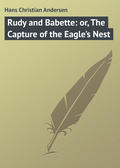
Ганс Христиан Андерсен
O. T., A Danish Romance
CHAPTER XXXIII
“He draws nearer and nearer to her.
‘O, give my hope an answer by this pink-flower.’
She sighs: ‘O, I will—no—I will not.’”
The Dancer, by PALUDAN-MÜLLER
“I shall get to know!” thought Otto. “This violent love cannot be evaporated.” He paid attention to every little occurrence. Eva was the same quiet, modest creature as formerly—a house-fairy who exercised a friendly influence over all. Wilhelm spoke with her, but not with passion, neither with affected indifference. However, we cannot entirely rely upon Otto’s power of observation: his glance was directed too often toward a dearer object—his attention was really directed to Sophie.
They walked in the garden.
“Once as you certainly know,” said Otto, “your brother had a fancy for the pretty Eva. Is it not, therefore, somewhat dangerous her living here? Has your mother been prudent?”
“For Wilhelm I am quite unconcerned!” answered Sophie. “Only take care of yourself! Eva is very amiable, and has very much changed for the better since she came here. My sister Louise quite raves about her, and my mother regards her almost as an adopted daughter. You have certainly remarked that she is not kept in the background. Yet she is weak; she resembles the tender mountain-flowers which grow in ice and snow, but which bow their heads in the soft mountain air, when it is warmed by the sun. It really seems to me that she is become weaker since she has enjoyed our care and happy days. When I saw her at Roeskelde she was far more blooming.”
“Perhaps she thinks of your brother—thinks of him with quiet sorrow?”
“That I do not think is the case,” replied Sophie; “otherwise Louise would have heard something of it. She possesses Eva’s entire confidence. You may make yourself easy, if you are jealous!”
“What make you conjecture this? My thoughts are directed above, and not beneath me!” said he, with a kind of pride, “I feel that I could never fall in love with Eva. Feel love toward her? no! Even when I think of it, I feel almost as though I had some prejudice against her. But you joke; you will rally me, as you have so often done. We shall soon part! Only two months longer shall I remain in Denmark! Two long years abroad! How much may occur in that time! Will you think of me—really think of me, Miss Sophie?” He bent, and kissed her hand.
Sophie became crimson. Both were silent.
“Are you here!” said the mother, who came out of a side walk.
Otto stooped lower, and broke one of the beautiful stocks which hung over the border.
“Are you taking Louise’s favorite flowers?” said she, smiling. “This bed is declared to be inviolable.”
“I was so unfortunate as to break it!” said Otto, confused.
“He wished to gather the dark-red pink for my table-garland!” said Sophie. “If he took it, my conscience would be clear!”
And they all three walked along speaking of cherries, gooseberries, of the linen on the bleaching-ground, and of the warm summer’s day.
In the evening Eva and the two sisters sat at their work, Otto and Wilhelm had taken their seats beside them. They spoke of Copenhagen.
Sophie knew how to introduce a number of little anecdotes, which she had gathered among the young ladies there. Otto entered into her ideas, and knew cleverly how to support what she said. What in reality interested young ladies was discussed.
“When a girl is confirmed, all manner of fancies awake!” said Otto. “She experiences a kind of inclination for the heart of man; but this may not be acknowledged, except for two friends to the clergyman and the physician. For these she has quite a passion, especially for the former; she stands in a kind of spiritual rapport with him. His physical amiability melts into the spiritual. Thus her first love one may designate clergyman-love.”
“That is well said!” exclaimed Sophie.
“He preaches himself so deeply into her heart!” pursued Otto. “She melts into tears, kisses his hand, and goes to church; but not for the sake of God, but on account of the sweet clergyman!”
“O, I know that so well!” said Sophie, and laughed.
“Fie! you do not mean so!” said Louise; “and I do not know how you can say such a thing Mr. Thostrup! That is frightful! You do not in the least know a young girl’s soul! do not know the pure feeling with which she inclines herself to the man who has laid open before her the holy things of religion! Do not make sport of the innocent, the pure, which is so far removed from every earthly impression!”
“I assure you,” said Otto, smiling, “were I a poet, I would make the clergyman-love ridiculous in a hundred witty epigrams; and were I a teacher, I would protest against it from the chair.”
“That would be scattering poison into a well!” said Louise. “You, as a man, do not know the pure, the holy sentiment which exists in a young girl’s bosom. Eva, thou art certainly of my opinion?”
“Neither is this Mr. Thostrup’s opinion?” answered she, and looked at him with a mild gravity.
Wilhelm laughed aloud.
CHAPTER XXXIV
“Alas, I am no sturdy oak!
Alas, I’m but the flower
That wakes the kiss of May!
And when has fled its little hour,
Will voice of Death obey.”
—RUCKERT.
The following afternoon came visitors—two young ladies from Nyborg, friends of Sophie and Louise. Before dinner they would take a walk through the wood to an inclosure where the flax was in bloom. Otto was to accompany them.
“I am also of the party!” said the Kammerjunker, who just galloped into the court-yard as the ladies, with Otto, were about setting out on their excursion. Thus the whole company consisted of five ladies and two gentlemen.
“The cows are not in the field over which we must go, are they?” asked Eva.
“No, my good girl!” returned Sophie; “you may be quite easy! Besides, we have two gentlemen with us.”
“Yes; but they would not be able to protect us from the unruly bullocks!” said Louise. “But we have nothing to fear. Where we are going the cows do not go until after they are milked. I am no heroine! Besides, it is not long since one bullock nearly gored the cowherd to death. He also gored Sidsel a great hole in her arm just lately: you remember the girl with her eyebrows grown together?”
“There is also in the wood a wild sow, with eleven sucking pigs!” said Sophie, in ironical gravity; “it would not be agree able to meet with her!”
“She is almost as dangerous as the bullocks!” said the Kammerjunker, and laughed at Eva.
The conversation took another turn.
“Shall we not visit Peter Cripple?” asked Sophie. “The gentlemen can then see the smith’s pretty daughter; she is really too beautiful to be his wife!”
“Is Peter Cripple married?” inquired Otto.
“No, the wedding will be held on Sunday!” replied the Kammerjunker; “but the bride is already in the house. The bans were published last Sunday, and they immediately commenced housekeeping together. This often takes place even earlier, when a man cannot do without a wife. She has taken him on account of his full money-bags!”
“Yes, with the peasant it is seldom love which brings about the affair!” said Louise. “Last year there was quite a young girl who married a man who might have been her grandfather. She took him only, she said, because he had such a good set of earthenware.”
“These were very brittle things to marry upon!” remarked Otto.
Meantime they were nearly come to the edge of the wood. Here stood a little house; hops hung luxuriantly over the hedge, the cat stood with bent back upon the crumbling edge of the well.
Sophie, at the head of the whole company, stepped into the room, where Peter Cripple sat on the table sewing; but, light and active as an elf, he sprang down from the table to kiss her hand. The smith’s pretty daughter was stirring something in an iron pot in the hearth. St. John’s wort, stuck between the beams and the ceiling, shot forth in luxuriant growth, prophesying long life to the inhabitants of the house. On the sooty ceiling glittered herrings’ souls, as a certain portion of the herring’s entrails is called, and which Peter Cripple, following the popular belief, had flung up to the ceiling, convinced that so long as they hung there he should be freed from the ague.
Otto took no part in the conversation, but turned over a quantity of songs which he found; they were stitched together in a piece of blue tobacco-paper. The principal contents were, “New, Melancholy Songs,” “Of the Horrible Murder,” “The Audacious Criminal,” “The Devil in Salmon Lane,” “Boat’s Fall,” and such things; which have now supplanted, among the peasants, the better old popular songs.
With Louise, Eva, and one of the ladies from Nyborg, Otto slowly preceded the others, who had still some pleasantries to say before leaving Peter Cripple and his bride.
“Shall we not go over the inclosure to the cairn?” said Louise. “It is clear to-day; we shall see Zealand. The others will follow us; here, from the foot-path, they will immediately discover us.”
Otto opened the gate and they went through the inclosure. They had already advanced a considerable way, when the Kammerjunker and his ladies reached the foot-path from which they could see the others.
“They are going to the cairn,” said he.
“Then they will have a little fright!” said Sophie. “Down in the corner of the inclosure lie the young cattle. They may easily mistake them for cows, and the wild bullocks!”
“Had we not better call them back?” asked the other lady.
“But we must frighten them a little,” said Sophie. “Shout to them that there are the cows!”
“Yes, that I can do with a clear conscience!” said the Kammerjunker; and he shouted as loud as he could, “There are the cows! Turn back! turn back!”
Eva heard it the first. “O God!” said she, “hear what they are calling to us!”
Otto glanced around, but saw no cows.
“They are standing still!” said Sophie; “call once again!”
The Kammerjunker shouted as before, and Sophie imitated the lowing of the cows. At this noise the young cattle arose.
Louise now became aware of them. “O heavens!” exclaimed she; “there, down in the corner of the inclosure, are all the cows!”
“Let us run!” cried Eva, and took to flight.
“For God’s sake, do not run!” cried Otto; “walk slowly and quietly, otherwise they may come!”
“Come away, away!” resounded from the wood.
“O Lord!” shrieked Eva, when she saw the creatures raise their tails in the air as soon as they perceived the fugitives.
“Now they are coming!” cried the lady who accompanied them, and sent forth a loud scream.
Eva fled first, as if borne by the wind; the lady followed her, and Louise ran on after them.
Otto now really saw all the cattle, which, upon the ladies flight, had instinctively followed, chasing over the field after them in the same direction.
Nothing now remained for him but, like the others, to reach the gate. This he opened, and had just closed again, when the cattle were close upon them, but no one had eyes to see whether the cattle were little or big.
“Now there is no more danger!” cried Otto, as soon as he had well closed the gate; but the ladies still fled on, passing among the trees until they reached the spot where the Kammerjunker and his two ladies awaited them with ringing laughter.
Sophie was obliged to support herself against a tree through all the amusement. It had been a most remarkable spectacle, this flight; Eva at the head, and Mr. Thostrup rushing past them to open the gate. Louise was pale as death, and her whole body trembled; the friend supported her arm and forehead on a tree, and drew a long breath.
“Bah!” again cried Sophie, and laughed.
“But where is Eva?” asked Otto, and shouted her name.
“She ran here before me!” said Louise; “she is doubtless leaning against a tree, and recovering her strength.”
“Eva!” cried Sophie. “Where is my hero: ‘I want a hero!’”26
Otto returned to seek her. At this moment Wilhelm arrived.
The Kammerjunker regretted that he had not seen the race with them, and related the whole history to him.
“O come! come!” they heard Otto shout. They found him kneeling in the high grass. Eva lay stretched out on the ground; she was as pale as death; her head rested in Otto’s lap.
“God in heaven!” cried Wilhelm, and flung himself down before her. “Eva! Eva! O, she is dead! and thou art to blame for it, Sophie! Thou hast killed her!” Reproachfully he fixed his eyes on his sister. She burst into tears, and concealed her face in her hands.
Otto ran to the peasant’s cottage and brought water. Peter Cripple himself hopped like a mountain-elf behind him through the high nettles and burdocks, which closed above and behind him again.
The Kammerjunker took Eva in his strong arms and carried her to the cottage. Wilhelm did not leave hold of her hand. The others followed in silence.
“Try and get her home,” said Wilhelm; “I myself will fetch the physician!” He rushed forth, and hastened through the wood to the ball, where he ordered the men to bring out a sedan-chair for the invalid; then had horses put into one of the lightest carriages, seated himself in it as coachman, and drove away to Nyborg, the nearest town, which, however, was distant almost twenty miles.
Sophie was inconsolable. “It is my fault!” she said, and wept.
Otto found her sitting before the house, under an elder-tree. She could not endure to see Eva’s paleness.
“You are innocent,” said Otto. “Believe me, to-morrow Eva will be completely restored! She herself,” added he, in an assuaging tone, “behaved in an imprudent manner. I warned her not to run. Her own terror is to blame for all.”
“No, no,” returned Sophie; “my folly, my extravagance, has caused the whole misfortune!”
“Now it is much better,” said the Kammerjunker, coming out of the house. “She must be devilish tender to fly before a few calves! I really must laugh when I think of it, although it did come to such an end!”
The men now arrived whom Wilhelm had sent with the sedan-chair.
Eva thought she could walk, if she might lean upon some one; but it would be better, her friends thought, if she were carried.
“Dost thou feel any pain?” asked Louise, and gave her a sisterly kiss on the brow.
“No, none at all,” replied Eva. “Do not scold me for having frightened you so. I am so fearful, and the bullock were close behind us.”
“They were, God help me, only calves!” answered the Kammerjunker; “they wished to play, and only ran because you ran!”
“It was a foolish joke of mine!” said Sophie, and seized Eva’s hand. “I am very unhappy about it!”
“O no!” said Eva, and smiled so pensively, yet happily. “To-morrow I shall be quite well again!” Her eye seemed to seek some one.
Otto understood the glance. “The physician is sent for. Wilhelm has himself driven over for him.”
Toward the middle of the wood the mother herself approached them; she was almost as pale as Eva.
All sought to calm her; Eva bowed her head to kiss the good lady’s hand. The Kammerjunker told the story to her, and she shook her head. “What an imprudent, foolish joke!” said she; “here you see the consequences!”
Not before late in the afternoon did Wilhelm return with the physician; he found his patient out of all danger, but prescribed what should still be done. Quiet and the warm summer air would do the most for her.
“See,” said Otto, when, toward evening he met Sophie in the garden, “to-day Wilhelm did not conceal his feelings!”
“I fear that you are right!” returned Sophie. “He loves Eva, and that is very unfortunate. Tell me what you know about it.”
“I know almost nothing!” said Otto, and told about little Jonas and the first meeting with Eva.
“Yes, that he has told us already himself! But do you know nothing more?” Her voice became soft, and her eyes gazed full of confidence into Otto’s.
He related to her the short conversation which he had had last autumn with Wilhelm, how angry he had been with his candid warning, and how since then they had never spoken about Eva.
“I must confide my fear to our mother!” said Sophie. “I almost now am glad that he will travel in two months, although we shall then lose you also!”
And Otto’s heart beat; the secret of his heart pressed to his lips; every moment he would speak it. But Sophie had always still another question about her brother; they were already out of the garden, already in the court-yard, and yet Otto had said nothing.
Therefore was he so quiet when, late in the evening, he and Wilhelm entered their chamber. Wilhelm also spoke no word, but his eye repeatedly rested expectantly on Otto, as if waiting for him to break the silence. Wilhelm stepped to the open window and drank in the fresh air, suddenly he turned round, flung his arms round Otto, and exclaimed, “I can no longer endure it! I must say it to some one! I love her, and will never give her up, let every one be opposed! I have now silently concealed my feelings for some months; I can do so no longer, or I shall become ill, and for that I am not made!”
“Does she know this?” asked Otto.
“No, and yes! I do not know what I should answer! Here at home I have never spoken alone with her. The last time when Weyse played on the organ at Roeskelde I had bought a pretty silk handkerchief, and this I took with me for her; I know not, but I wished to give her pleasure. There came a woman past with lovely stocks; I stood at the open window; she offered me a bouquet, and I bought it. ‘Those are lovely flowers!’ said Eva, when she entered. ‘They will fade with me!’ said I; ‘put them in water and keep there for yourself!’ She wished only to have a few, but I obliged her to take them all: she blushed, and her eyes gazed strangely down into my soul. I know not what sort of a creature I became, but it was impossible for me to give her the handkerchief; it seemed to me that this would almost be an offense. Eva went away with the flowers, but the next morning it seemed to me that she was uneasy; I fancied I saw her color come and go when I bade her adieu! She must have read the thoughts in my soul!”
“And the handkerchief?” interrupted Otto.
“I gave it to my sister Sophie,” said Wilhelm.
CHAPTER XXXV
“Tell me
What would my heart?
My heart’s with thee,
With thee would have a part.”
GOETHE’S West-östlicher Divan.
“There stands the man again—
The man with gloomy mien.”
Memories of Travel, by B. C. INGEMANN.
Several days passed; the fine crimson again returned to Eva’s cheeks. The first occasion of her going out with the others was to see the rape-stalks burned. These were piled together in two immense stacks. In the morning, at the appointed hour, which had been announced through the neighborhood that no one might mistake it for a conflagration, the stalks were set fire to. This took place in the nearest field, close beside the hall, where the rape-seed was threshed upon an out-spread sail.
The landscape-painter, Dahl, has given us a picture of the burning Vesuvius, where the red lava pours down the side of the mountain; in the background one sees across the bay as far as Naples and Ischia: it is a piece full of great effect. Such a splendid landscape is not to be found in flat Denmark, where there are no great natural scenes, and yet this morning presented even there a picture with the same brilliant coloring. We will study it. In the foreground there is a hedge of hazels, the nuts hang in great clusters, and contrast strongly with their bright green against the dark leaves; the blue chicory-flower and the blood-red poppy grew on the side of the ditch, upon which are some tall rails, over which the ladies have to climb: the delicate sylph-like figure is Eva. In the field, where nothing remains but the yellow stubble, stand Otto and Wilhelm; two magnificent hounds wag their tails beside them. To the left is a little lake, thickly overgrown with reeds and water-lilies, with the yellow trollius for its border. In the front, where the wood retreats, lie, like a great stack, the piled-together rape-stalks: the man has struck fire, has kindled the outer side of them, and with a rapidity like that of the descending lava the red fire flashes up the gigantic pile. It crackles and roars within it. In a moment it is all a burning mound; the red flames flash aloft into the blue air, high above the wood which is now no longer visible. A thick black smoke ascends up into the clear air, where it rests like a cloud. Out of the flames, and even out of the smoke, the wind carries away large masses of fire, which, crackling and cracking, are borne on to the wood, and which fill the spectator with apprehension of their falling upon the nearest trees and burning up leaf and branch.
“Let us go further off,” said Sophie; “the heat is too great here.”
They withdrew to the ditch.
“O, how many nuts!” exclaimed Wilhelm; “and I do not get one of them! I shall go after them if they be ripe.”
“But you have grapes and other beautiful fruit!” said Eva smiling. “We have our beautiful things at home!”
“Yes, it is beautiful, very beautiful at home!” exclaimed Wilhelm; “glorious flowers, wild nuts; and there we have Vesuvius before us!” He pointed to the burning pile.
“No,” said Sophie; “it seems to me much more like the pile upon which the Hindoo widow lays herself alive to be burned! That must be horrible!”
“One should certainly be very quickly dead!” said Eva.
“Would you actually allow yourself to be burned to death, if you were a Hindoo widow—after, for instance, Mr. Thostrup, or after Wilhelm,” said she, with a slight embarrassment, “if he lay dead in the fire?”
“If it were the custom of the country, and I really had lost the only support which I had in the world—yes, so I would!”
“O, no, no!” said Louise.
“In fact it is brilliant!” exclaimed Sophie.
“Burning is not, perhaps, the most painful of deaths!” said Otto, and plucked in an absent manner the nuts from the hedge. “I know a story about a true conflagration.”
“What is it like?” asked Wilhelm.
“Yet it is not a story to tell in a large company; it can only be heard when two and two are together. When I have an opportunity, I shall tell it!”
“O, I know it!” said Wilhelm. “You can relate it to one of my sisters there, whichever you like best! Then I shall—yes, I must relate it to Eva!”
“It is too early in the day to hear stories told!” said Louise; “let us rather sing a song!”
“No, then we shall have to weep in the evening,” replied Wilhelm. And they had neither the song nor the story.
Mamma came wandering with Vasserine, the old, faithful hound: they two also wished to see how beautiful the burning looked. It succeeded excellently with the rape-stalks; but the other burning, of which the story was to be told, it did not yet arrive at an outbreak! It might be expected, however, any hour in the day.
In the evening Otto walked alone through the great chestnut avenue. The moon shone brightly between the tree-branches. When he entered the interior court Wilhelm and Sophie skipped toward him, but softly, very softly. They lifted their hands as if to impress silence.
“Come and see!” said Sophie; “it is a scene which might be painted! it goes on merrily in the servants’ hall; one can see charmingly through the window!”
“Yes, come!” said Wilhelm.
Otto stole softly forward. The lights shone forth.
Within there was laughter and loud talking; one struck upon the table, another sung,—
“And I will away to Prussia land,
Hurrah!
And when I am come to Prussia land,
Hurrah!”27
Otto looked in through the window.
Several men and maids sat within at the long wooden table at the end of this stood Sidsel in a bent attitude, her countenance was of a deep crimson; she spoke a loud oath and laughed—no one imagined that they were observed. All eyes were riveted upon a great fellow who, with his shirt-sleeves rolled up, and a pewter tankard in his hand, was standing there. It was the German Heinrich, who was exhibiting to them his conjuring tricks. Otto turned pale; had the dead arisen from the bier before him it could not have shocked him more.
“Hocus-pocus Larifari!” cried Heinrich within, and gave the tankard to a half-grown fellow, of the age between boy and man.
“If thou hast already a sweetheart,” said he; “then the corn which is within it will be turned to flour; but if thou art still only a young cuckoo, then it will remain only groats.”
“Nay, Anders Peersen!” said all the girls laughing, “now we shall see whether thou art a regular fellow!”
Sophie stole away.
The echoing laughter and clapping of hands announced the result.
“Is it not the same person who was playing conjuring tricks in the park?” inquired Wilhelm.
“Yes, certainly,” replied Otto; “he is to me quite repulsive!” And so saying, he followed Sophie.
Late in the evening, when all had betaken themselves to rest, Wilhelm proposed to Otto that they should make a little tour, as he called it.
“I fancy Meg Merrilies, as my sister calls Sidsel,” said he, “has made a conquest of the conjuror, although he might be her father. They have been walking together down the avenue; they have been whispering a deal together; probably he will to-night sleep in one of the barns. I must go and look after him; he will be lying there and smoking his pipe, and may set our whole place on fire. Shall we go down together? We can take Vasserine and Fingel with us.”
“Let him sleep!” said Otto; “he will not be so mad as to smoke tobacco in the straw! To speak candidly, I do not wish to be seen by him. He was several times at my grandfather’s house. I have spoken with him, and now that I dislike him I do not wish to see him!”
“Then I will go alone!” said Wilhelm.
Otto’s heart beat violently; he stood at the open window and looked out over the dark wood, which was lit up by the moon. Below in the court he heard Wilhelm enticing the dogs out. He heard yet another voice, it was that of the steward, and then all was again silent. Otto thought upon the German Heinrich and upon Sophie, his life’s good and bad angels; and he pictured to himself how it would be if she extended to him her hand—was his bride! and Heinrich called forth before her the recollections which made his blood curdle.
It seemed to him as if something evil impended over him this night. “I feel a forewarning of it!” said he aloud.
Wilhelm came not yet back.
Almost an hour passed thus. Wilhelm entered, both dogs were with him; they were miry to their very sides.
“Did you meet any one?” inquired Otto.
“Yes, there was some one,” said Wilhelm, “but not in the barn. The stupid dogs seemed to lose their nature; it was as if there was a somebody stealing along the wall, and through the reeds in the moat. The hounds followed in there; you can see how they look!—but they came the next moment back again, whined, and hung down their ears and tails. I could not make them go in again. Then the steward was superstitious! But, however, it could only be either the juggler, or one of the servant-men who had stilts. How otherwise any one could go in among the reeds without getting up to their necks, I cannot conceive!”
All was again perfectly still without. The two friends went to the open window, threw their arms over each other’s shoulders, and looked out into the silent night.






